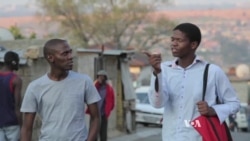Poverty, lack of infrastructure and a lack of guidance often lead young people in South African townships caught in the same cycle of poverty that the previous generation experienced. A program in Johannesburg's Alexandra township, in which South African and foreign professionals serve as mentors, aims to give students the opportunity to broaden their horizons.
The idea is to inspire them to dream big.
Linda Giuricich of St. Mary High School says the program — Sizanani, a zulu word meaning "help each other" — not only gives students career advice but also helps develop their skills.
"We began the Sizanani mentorship with the idea of pairing the learners on a project, who come from very, very poor backgrounds, with members from the Johannesburg community so that they could assist them mostly for choices for tertiary education, as well as to introduce them to wider social activities" in Johannesburg.
Most of the youths in the program live in neighborhoods of made up of shacks and ramshackle houses. The area has one of the highest unemployment rates in South Africa.
Student Musi Nomathole, who dreams of becoming a biochemist or a pilot, says the mentorship program brings him the guidance he lacks.
“My parents can't help me" with the process of gaining admission to a university, "so that's why I need a mentor to help me," he said.
Solomon Sikhosana, Nomathole's mentor, is a banker who grew up in a township himself. He said he joined the program to try to give hope to teenagers and show them it is possible to succeed, even when the odds are against them.
There is much that someone of Nomathole's age, "coming from this environment, can learn from some of us who, in many ways, come from the same background" yet "managed to break through the cycle," Sikhosana said.
The Sizanani program has close to 100 mentors and about 150 mentees, and an increasing number of them are being accepted into universities.
But the hurdles don't stop there, said Sizanani program manager Valérie Hirsch. Money is needed to help pay for the students' scholarships, she said, because "they come from very poor families and can't pay college fees."
Last year, the program managed to provide financial backing to all mentees who didn't get government loans. One sponsor has withdrawn, however, so the program's prospects for next year are uncertain.





